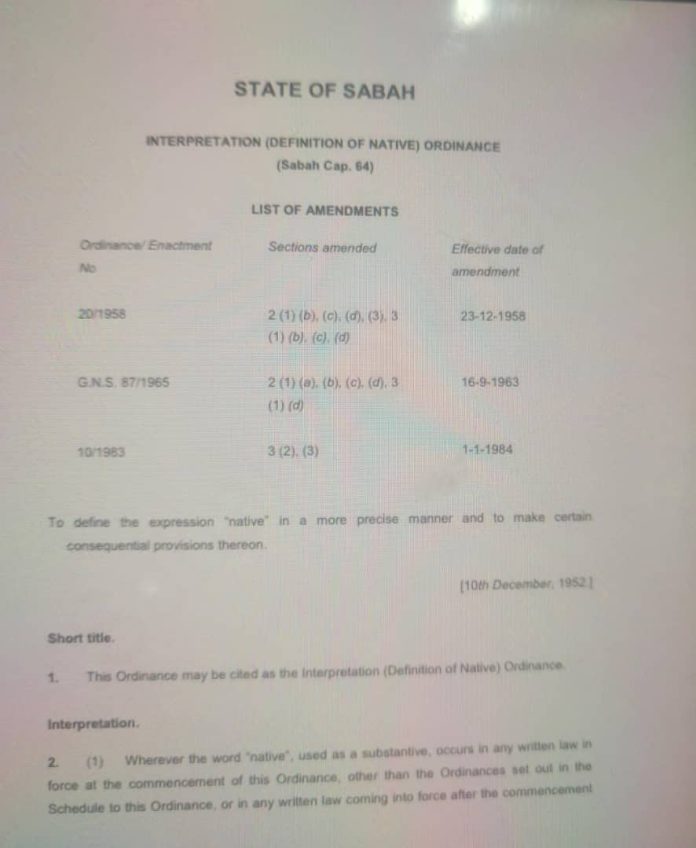By Remy Majangkim, MA63, Activist, Tutor, and Historian
KOTA KINABALU: Good day, everyone. I wish you all a great weekend ahead. So, while you are with your activity this weekend, ponder this question: Are you a native of Sabah? What constitutes a native in Sabah? How does it intertwine with the Sabah Native Court?
Recently, in the news, it was announced that the Sabah Native Court, Shariah Court, and Civil Court would be on par. One would wonder what the difference is between these separate courts.
Shariah Court has jurisdiction over Islamic law and personal and family law for Muslims. The likes of Betrothal, Marriage, Divorce, Legitimacy, Dowry, Maintenance, Adoption, Succession, and Religious Endowments.
The civil court resolves disputes between two parties or more, likely individuals or companies, involving disputes over negligence, and most often in criminal cases.
Sabah and Sarawak Native Courts have special jurisdiction over native customary law. So this leads to other questions: What is a customary law? It is a set of customs, practices, and beliefs that a community accepts as mandatory rules of conduct within the community.
All three must be guided by the one umbrella called the Federal Constitution, as stated under Article 4 of the Supreme Law of the Federation.
Here is where it gets interesting: there are 42 native ethnic groups and 200 sub-ethnic groups in Sabah. These communities normally have their own dialects and practices, headed by a village head, or Ketua Kampung. Community disputes were resolved within the village or may revert to the Native Court.
Surprisingly, most of these ethnic groups do not have legal identity rights under the law. In documents leading up to the formation of Malaysia, discussion has been made that the identity of the natives in Sarawak will be managed and approved by the Federal Government (as Sarawak did recently), and for Sabah, it falls under the purview of the State Government.
These documents can be seen under the INTERPRETATION (DEFINITION OF NATIVE) ORDINANCE (SABAH CAP 64). It gives a legal identity to any deserving Native American in Sabah. These documents were never upgraded since 1952 and are prone to multiple abuses.
In 2007, Malaysia ratified the United Nations Declaration on the Rights of Indigenous Peoples (UNDRIP). Malaysia’s indigenous population includes the “Orang Asli” and “Anak Negeri” (Sabah and Sarawak). Under the United Nations, the definition of indigenous is “distinct social and cultural groups that share collective ancestral ties to the lands and natural resources where they live, occupy, or from which they have been displaced.”
Steps must be taken to ensure the improvement of the Interpretation (Definition of Native) ordinance to be on the same par with the Native Court, notably with the Native Court Enactment of 1992. The village heads need to be trained and adhere to the terms of the Native Court.
I saw and got to know about an incident involving a village head who abused his power by acknowledging newly arrived as natives of his communities.
Below are some examples of abuses I experienced over the years.
In fact, we see that in real life, people just arrive from a neighbouring country through the sea. So by doing so, he facilitates their application for citizenship.
Other cases in which the holder of IMM13 married a local, had kids with the first wife, got a divorce, and remarried undocumented individuals had children and sent them to their ex-wife to be raised in the village. Obviously, as children, they will easily pick up on the local language. Now, when the mobile court arrives in the village to register undocumented children, this is where the road to citizenship begins, and the village head concurs.
Interestingly, local political parties in Sabah are staying away from this topic, which some say is a career-ending move. But it is the right thing to do for all of us locals in Sabah. Now who dares to take up this cause?


